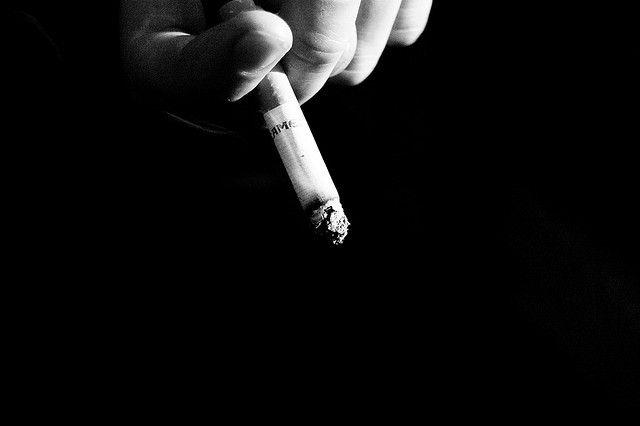I started smoking in 2006 during my graduate studies in psychology.
I was sitting with a friend on his porch, watching as he used his thumbs to craft a hand-rolled cigarette. There was something really wondrous about it.
His preparation was ritualistic and the way he smoked it created an almost sacred place in time. Native Americans have used tobacco ceremonially for centuries. And curanderos (medicine men and women) have used plants like ayahuasca in sacred ceremony for just as long.
For the past 10 years I have smoked on and off. I would periodically stop smoking is because I would invariably develop a smoker’s cough after a month of one or two of these hand-rolled cigarettes a day.
My cough appalled me, and I would quit—for a time—but then months later, I would start up again.
I started to get a little scared—was I getting addicted? Was this little experiment out of control?
So about a month ago, I enrolled the help of someone in my community and entrusted him to “hold” my cigarettes for me. I would then buy them off him at the cool cost of $1.00 per cigarette. If I wanted a second, the price doubled to $2.00, and a third to $3.00. My goal was to keep consumption down by making it downright expensive for me to smoke.
Not having them physically in my possession was supposed to be a big help.
The problem: He often wasn’t home when I got my craving. So, unbeknownst to him, I went out and bought some loose tobacco to roll my own in times of need.
But loose tobacco (especially without a filter) is really, really strong. I soon started to wake up with this ugly, heavy feeling in my chest, like there was a weight placed on top of it that I had to struggle against with each breath. Needless to say, my body was not happy with me.
I should note that I’ve otherwise been a pretty healthy guy. I stretch a lot, try to eat well, I exercise. So, smoking has been my dirty little secret.
I also started to realize that when I was smoking, I wasn’t really enjoying it. Near the end, before I quit, I started to smoke about five inhalations, then put it out; then, I’d come back later and repeat. So, I’d get about four rounds out of a single cigarette.
Clever, I know.
So how did I quit? And how do I know it’s “forever” this time? And how might this also help you?
Let me start by saying that I was never even close to a “pack a day” smoker. The most cigarettes I’ve ever smoked in a single day was four—okay, maybe five.
To quit, first develop a strategy.
Step 1: If you are going to smoke, don’t do anything else but smoke.
This may not seem revelatory, but I believe it is. I see so many people smoking while talking on their phones, driving, or being otherwise distracted.
If you’re going to do something as crazy to your body as smoke, my suggestion is to go all in. Be fully present.
I lived in a community that had a farm a few years ago, and my ritual was to take a nice walk to a bench overlooking the fields, and I would sit and enjoy my hand-rolled cigarette everyday around sunset. It was silent, meditative, “me time.” And it was simply majestic.
But as much as I tried to keep it ritualistic, I couldn’t. And that’s why I had to quit. I started smoking on the phone (so much for presence). And that’s also one of the things that bothered me. Someone told me that having an addiction meant having an area of your life where you are literally out of control.
And that made me mad. Was I that weak?
Step 2: Get honest.
We are not in control of ourselves if we’re addicted. Really allow that to sink in (no matter what your flavor of addiction). If you’re addicted, that means you are allowing something—other than yourself—to control your life. How sad!
Step 3: Don’t try to quit.
Do the opposite of quit. Get even deeper into your smoking habit.
You heard me. Go deeper. Really experience your smoking in a new way. What’s your experience while you’re smoking? How do you feel after you finish your cigarette? The next morning?
Don’t feel guilty about it. Just become aware.
Step 4: Get real about the impact that your smoking is having on you.
What impact does smoking have on your lungs, on your present body, on your future body, on your future family?
Leave guilt out of it. Just get in touch. Get real.
And listen.
I think resisting addictions is ineffective. I believe that, though counter-intuitive, the breakthrough happens not by resisting but through acceptance and awareness.
Because once we accept whatever aspect of our life is controlling us and become more aware, a new space will open up where we will get to freely choose how we move forward.
I quit smoking tobacco a few days ago. I don’t even want a cigarette anymore. Truth be told, the thought of having one actually disgusts me now.
But I could only get to this place by diving in fully, without guilt, and by experiencing what I was doing in a meaningful way. Had I just tried to quit, it would have been forcing myself to do something I wasn’t ready to do—and that would have ended in failure.
Just like it does so often for so many smokers.
But by giving into your tobacco addiction, paradoxically…you can be free.
~
~
~
Author: Alex Obed
Image: Denis Defreyne/Flickr
Editor: Danielle Beutell/Emily Bartran
Copy Editor: Khara-Jade Warren
Social Editor: Yoli Rammazina
 Share on bsky
Share on bsky






Read 0 comments and reply